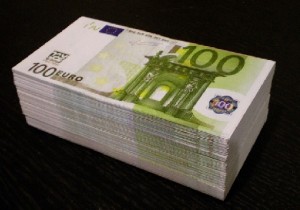Central governments fear deflation, a condition of a general drop prices or economic contraction, because this normally corresponds with high unemployment and politicians quickly lose their job. So any hint of inflation being too low and headed for deflation and governments respond with stimulus spending, dropping interest rates, or other market manipulating schemes. These tactics to prevent an economic downturn may delay it, but unfortunately, will ultimately exacerbate the regular business cycles of boom & bust.
This week, the European Central Bank (ECB) is in such a panic over low inflation and low growth that they cut their interbank interest rate from zero to a negative rate of -0.10%. Charging banks money to keep their excess reserves at the ECB is an incentive for banks to do anything else with this money, like a hot potato, the ECB hopes banks will loan more of it out to consumers and businesses to spur the economy to grow. However, what is more likely is that banks will pass this charge (or more accurately, this ECB tax) onto depositors in the form of fees or negative-interest rates. This will likely further reduce bank capital as depositors will withdraw the money and hold it themselves for free. Negative interest rates is also a lowering of interest rates which makes the Euro less attractive as a currency. So the Euro declined to a 4 month low on this news, which is part of the ECB plan to help European exporters grow with a cheaper currency.
Meanwhile, in the U.S. there are several troubling charts of ongoing economic weakness that has not turned around since 2008:
- U.S. homeownership rate continues to fall
- 29% of all U.S. homes still have negative equity (mortgage is higher than the value of the home)
- Employment participation has steadily dropped to a 36-year low
- The velocity of money (M2) has declined to its lowest level, ever recorded, signaling a very stagnant economy
How to position yourself among all of these deflationary signals? First, you have to remember that the U.S. Federal Reserve has spurred asset bubbles with artificially low interest rates: 5-year price bubbles in both the stock and real estate markets. Now Europe is actively trying to create their own asset bubbles to kick start its economy. To invest alongside the U.S. and European government’s policies, the place for some of your money is still large-cap U.S. & European stocks, along with investment-grade U.S. and European real estate.

